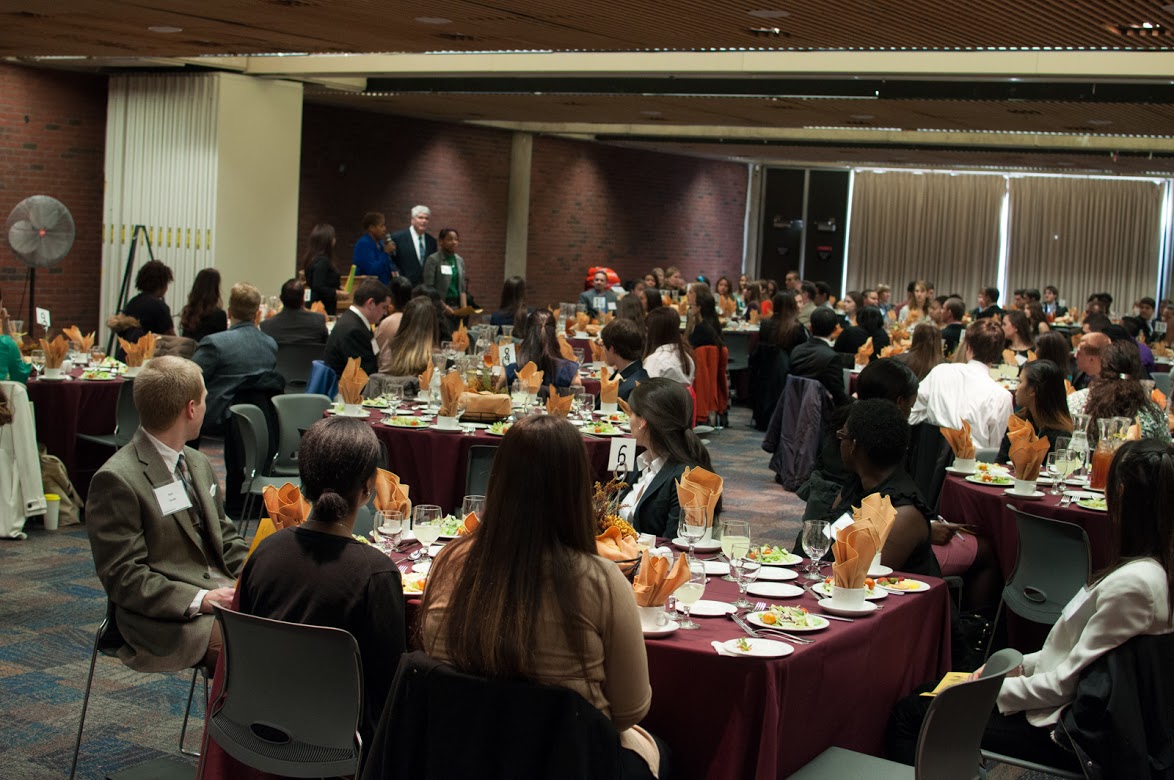The second annual “Dining Out in Professional Style” event was held last Wednesday, Nov. 13, featuring renowned business etiquette expert Robert A. Shutt and sponsored by the Career Center.
“This is important because it eliminates distraction of inappropriate behavior,” Shutt said regarding professional dining etiquette.
People may not notice appropriate behavior much, but they certainly realize when inappropriate behavior is being conducted, according to Shutt.
With over 200 students in attendance, each one of the 31 round tables was filled with students and one employer. These employers were representatives of companies such as Johnson & Johnson, Mondel?z International and New Jersey State Nursing Association.
“As professionals, I think we were expected to know a lot about this,” said Bernie Nicholas, an employer representing Mondel?z International. “But I certainly learned a lot.”
Both Nicholas and his co-representative, Larry Osman, expressed the significant value students are receiving from this presentation. The point of mixing students and employers was to make connections and relationships.

“Shake the hand of someone who could potentially change your life forever,” Shutt said. “Work the room.”
The purpose of the event, Shutt said, was to create new relationships and strengthen existing ones. Shutt has traveled throughout the United States, teaching adults and students the proper etiquette of professional dining.
Shutt began by explaining the different focuses between business etiquette and social etiquette. The social focus was to have “good times and good foods.”
“Comradery and cuisine,” Shutt said. “A business meal may have an impact on your future.”
Etiquette dining dates back to the years of George Washington, when he created the “102 Rules of Civility.” Shutt emphasized two rules from Washington’s list: one, sit not when others stand, and, two, sleep not when others speak. Shutt revised the latter to “sleep not, text not, Blackberry not.”
“Business evaluation starts 15 minutes before you think it’s going to occur,” Shutt said.
In professional business dining, one follows the leader of the group.
Shutt then explained the controversial debate over the styles of eating with a fork and knife. There is the American Style, the knife in the dominant hand, fork in other, and when eating the food one switches the fork in the other hand. Then there is the Continental Style, which requires no switch of the hand. Knives should always be placed with the sharp side facing away from guests at the table.
“(Otherwise), it is too aggressive,” Shutt said.
Even advice on how to stop the flow of a spilt drink was given during the event.
“I learned little things about etiquette,” freshman communication studies major Megan Strucko said.
The one who organizes the meal pays, said Shutt.
“When done, say ‘thank you’ times two,” Shutt said. “One for the conversation and one for the meal.”
Retention increases 500 percent when a letter is in one’s hand, not just electronically. Therefore, Shutt suggests the best way to say “thank you” is a good old-fashioned handwritten letter.
“This is a wonderful program and it is a privilege to be here with you all,” Shutt said.
When he was later asked if he wished to make a final comment, he said with a smile and index finger pointed, “Manner matters and courtesy counts.”






